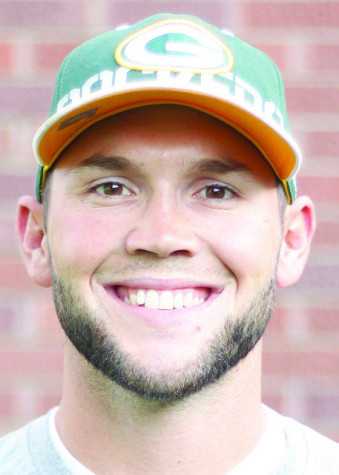EWU long snapper Jake Potter earns respect from teammates
October 4, 2012
When EWU secondary coach and special teams coordinator Jeff Schmedding talks about his senior long snapper Jake Potter, his eyes light up.
“He’s very devoted to that specific skill,” Schmedding said. “He’s mentally tough. He has been in good situations early in his career and he has been in bad situations. He has done a great job and he stepped it up. He’s the first guy I’m making sure is okay.”
The skill to which Schmedding refers is long snapping. The long snapper’s duties include, but are not limited to, snapping to the holder on field goals and extra points, snapping to the punter and covering punts down the field. It is one of the most crucial positions in football.
“They got to be mentally tough,” Schmedding said. “You got to be able to do it in critical situations, and every time they’re out there is a critical situation. On top of that, you got to be devoted to your craft. That’s their deal and they got to be great. It’s not very noticed and that’s a good thing if you’re doing well.”
According to Potter, the key to long snapping is not to be noticed. Do the job according to plan and nobody will know your name. But just one bad snap in a crucial situation and everyone will be talking about you. For Potter, that can be tough.
“Adjusting was kind of tough,” Potter said. “First, I’m not playing a ton because I’m only on the field 10 snaps a game. [It’s hard] dealing with knowing the fact that the only time anybody’s going to hear my name is if I mess up and mess the snap up or screw something up in some way.”
Potter says the best way to ensure that he does not mess up is to rely on practice and repetition and not try to overthink the process.
“It’s basically all muscle memory,” Potter said. “When I go up I don’t really remember thinking about anything, I just go up and just do what I’ve done a thousand times. I can’t really think about form because that’s when you actually second-guess yourself or second-guess your abilities. I’ve done it enough to know that if I do what I do every time that it’s going to be good.”
According to his punter Jake Miller and his holder Jeff Minnerly, Potter is the gold standard in long snapping.
“Pott[er] does a good job with placement and spiral,” Miller said. “It’s very important. The better he snaps, the better the operation as a whole.”
Minnerly, the team’s holder as well as an All-Big Sky starting safety, raves about Potter’s steadiness and reliability.
“I couldn’t even tell you how many snaps there have been between practice and games,” Minnerly said. “He’s just unbelievably consistent.”
The most important technique factor in being consistent with his snapping, according to Potter, is his grip and hand placement once he approaches the ball.
“I make sure my feet are even so that my aiming point is right. I step up to the ball and grip. My hand placement is the biggest thing. If you change that even half an inch it can drastically change your snap’s pace, speed and location. Hand placement and grip are the most important.”
Potter has to change his snaps during the game depending on whether he is snapping to the punter on a punt or to the holder on a field goal, but he says it is not very difficult to vary between the two.
“With the punt you’re going to have to throw it a little bit harder just because they’re 15 yards away as opposed to on a field goal they’re seven and a half yards away. Basically it’s the release point, just releasing it higher and throwing it harder.”
Potter’s job is not finished once he snaps the ball. Depending on the scheme, Potter will stay in and block or release downfield and attempt to slow down the opposing team’s return-man. Punter Jake Miller raves about Potter’s ability to corral the returner.
“Doing the film he always gets down there first because it’s designed for that to happen,” Miller said. “He does a good job with keeping them contained and limiting the return if there is one.”
Even in inclement weather, Potter stays true to the form he has practiced thousands and thousands of times.
“You can’t really make a whole lot of adjustments in a position like this. If it’s really windy and it’s a side wind you’re gonna have to compensate a little bit, but form-wise the last thing you want to change, especially on a game day, is your form. You’re working through the week, and basically your whole career, to perfect your form and get it the same every time. So the last thing you want to do is change your form.”








